Published Books
Peter Pomerantsev: Nothing Is True And Everything Is Possible
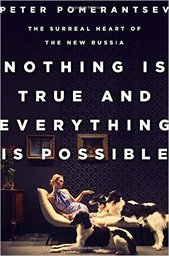
In the new Russia, even dictatorship is a reality show.
Professional killers with the souls of artists, would-be theater directors turned Kremlin puppet-masters, suicidal supermodels, Hell’s Angels who hallucinate themselves as holy warriors, and oligarch revolutionaries: welcome to the glittering, surreal heart of twenty-first-century Russia. It is a world erupting with new money and new power, changing so fast it breaks all sense of reality, home to a form of dictatorship—far subtler than twentieth-century strains—that is rapidly rising to challenge the West.
When British producer Peter Pomerantsev plunges into the booming Russian TV industry, he gains access to every nook and corrupt cranny of the country. He is brought to smoky rooms for meetings with propaganda gurus running the nerve-center of the Russian media machine, and visits Siberian mafia-towns and the salons of the international super-rich in London and the US. As the Putin regime becomes more aggressive, Pomerantsev finds himself drawn further into the system.
Dazzling yet piercingly insightful, Nothing Is True and Everything Is Possible is an unforgettable voyage into a country spinning from decadence into madness.
Professional killers with the souls of artists, would-be theater directors turned Kremlin puppet-masters, suicidal supermodels, Hell’s Angels who hallucinate themselves as holy warriors, and oligarch revolutionaries: welcome to the glittering, surreal heart of twenty-first-century Russia. It is a world erupting with new money and new power, changing so fast it breaks all sense of reality, home to a form of dictatorship—far subtler than twentieth-century strains—that is rapidly rising to challenge the West.
When British producer Peter Pomerantsev plunges into the booming Russian TV industry, he gains access to every nook and corrupt cranny of the country. He is brought to smoky rooms for meetings with propaganda gurus running the nerve-center of the Russian media machine, and visits Siberian mafia-towns and the salons of the international super-rich in London and the US. As the Putin regime becomes more aggressive, Pomerantsev finds himself drawn further into the system.
Dazzling yet piercingly insightful, Nothing Is True and Everything Is Possible is an unforgettable voyage into a country spinning from decadence into madness.
bill mckibben: oil and honey: the education of an unlikely activists
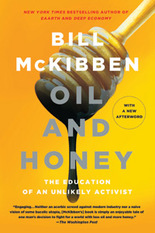
Bestselling author and environmental activist Bill McKibben recounts the personal and global story of the fight to build and preserve a sustainable planet
Bill McKibben is not a person you'd expect to find handcuffed and behind bars, but that's where he found himself in the summer of 2011 after leading the largest civil disobedience in thirty years, protesting the Keystone XL pipeline in front of the White House.
With the Arctic melting, the Midwest in drought, and Irene scouring the Atlantic, McKibben recognized that action was needed if solutions were to be found. Some of those would come at the local level, where McKibben joins forces with a Vermont beekeeper raising his hives as part of the growing trend toward local food. Other solutions would come from a much larger fight against the fossil-fuel industry as a whole.
Oil and Honey is McKibben’s account of these two necessary and mutually reinforcing sides of the global climate fight—from the center of the maelstrom and from the growing hive of small-scale local answers. With empathy and passion he makes the case for a renewed commitment on both levels, telling the story of raising one year’s honey crop and building a social movement that’s still cresting.
Bill McKibben is not a person you'd expect to find handcuffed and behind bars, but that's where he found himself in the summer of 2011 after leading the largest civil disobedience in thirty years, protesting the Keystone XL pipeline in front of the White House.
With the Arctic melting, the Midwest in drought, and Irene scouring the Atlantic, McKibben recognized that action was needed if solutions were to be found. Some of those would come at the local level, where McKibben joins forces with a Vermont beekeeper raising his hives as part of the growing trend toward local food. Other solutions would come from a much larger fight against the fossil-fuel industry as a whole.
Oil and Honey is McKibben’s account of these two necessary and mutually reinforcing sides of the global climate fight—from the center of the maelstrom and from the growing hive of small-scale local answers. With empathy and passion he makes the case for a renewed commitment on both levels, telling the story of raising one year’s honey crop and building a social movement that’s still cresting.
Traffic: Why We Drive The Way We Do By Tom Vanderbilt
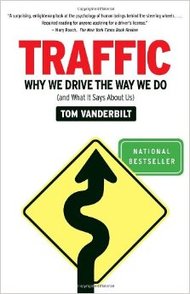
In this brilliant, lively, and eye-opening investigation, Tom Vanderbilt examines the perceptual limits and cognitive underpinnings that make us worse drivers than we think we are. He demonstrates why plans to protect pedestrians from cars often lead to more accidents. He uncovers who is more likely to honk at whom, and why. He explains why traffic jams form, outlines the unintended consequences of our quest for safety, and even identifies the most common mistake drivers make in parking lots. Traffic is about more than driving: it's about human nature. It will change the way we see ourselves and the world around us, and it may even make us better drivers.
gone Tomorrow: The Hidden Life of Garbage by heather rogers
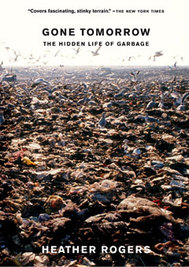
Eat a take-out meal, buy a pair of shoes, or read a newspaper, and you’re soon faced with a bewildering amount of garbage. The United States is the planet’s number-one producer of trash. Each American throws out 4.5 pounds daily. But garbage is also a global problem; the Pacific Ocean is today six times more abundant with plastic waste than zooplankton. How did we end up with this much rubbish, and where does it all go? Journalist and filmmaker Heather Rogers answers these questions by taking readers on a grisly, oddly fascinating tour through the underworld of garbage.
Said to “read like a thriller” (Library Journal), Gone Tomorrow excavates the history of rubbish handling from the 1800s to the present, pinpointing the roots of today’s waste-addicted society. With a “lively authorial voice” (New York Press), Rogers draws connections between modern industrial production, consumer culture, and our throwaway lifestyle. She also investigates controversial topics like the politics of recycling and the export of trash to poor countries, while offering a potent argument for change.
Said to “read like a thriller” (Library Journal), Gone Tomorrow excavates the history of rubbish handling from the 1800s to the present, pinpointing the roots of today’s waste-addicted society. With a “lively authorial voice” (New York Press), Rogers draws connections between modern industrial production, consumer culture, and our throwaway lifestyle. She also investigates controversial topics like the politics of recycling and the export of trash to poor countries, while offering a potent argument for change.
Bloodlands: Europe between Hitler and Stalin by Timothy Snyder
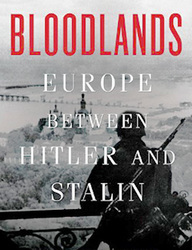
Americans call the Second World War “The Good War.” But before it even began, America’s wartime ally Josef Stalin had killed millions of his own citizens—and kept killing them during and after the war. Before Hitler was finally defeated, he had murdered six million Jews and nearly as many other Europeans. At war’s end, both the German and the Soviet killing sites fell behind the iron curtain, leaving the history of mass killing in darkness. Bloodlands is a new kind of European history, presenting the mass murders committed by the Nazi and Stalinist regimes as two aspects of a single history, in the time and place where they occurred: between Germany and Russia, when Hitler and Stalin both held power. Assiduously researched, deeply humane, and utterly definitive, Bloodlands will be required reading for anyone seeking to understand the central tragedy of modern history.
The Democracy Project: A History, A Crisis, A Movement by david graeber
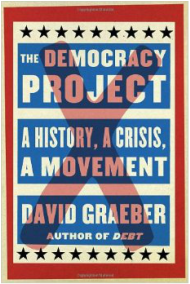
David Graeber, one of the most influential scholars and activists of his generation, takes readers on a journey through the idea of democracy, provocatively reorienting our understanding of pivotal historical moments, and extracts their lessons for today—from the birth of Athenian democracy and the founding of the United States of America to the global revolutions of the twentieth century and the rise of a new generation of activists. Underlying it all is a bracing argument that in the face of increasingly concentrated wealth and power in this country, a reenergized, reconceived democracy—one based on consensus, equality, and broad participation—can yet provide us with the just, free, and fair society we want.
The Democracy Project tells the story of the resilience of the democratic spirit and the adaptability of the democratic idea. It offers a fresh take on vital history and an impassioned argument that radical democracy is, more than ever, our best hope.
The Democracy Project tells the story of the resilience of the democratic spirit and the adaptability of the democratic idea. It offers a fresh take on vital history and an impassioned argument that radical democracy is, more than ever, our best hope.
The Honor Code: How Moral Revolutions Happen by kwame anthony appiah
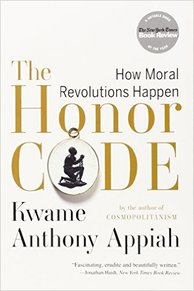
In this groundbreaking work, Kwame Anthony Appiah, hailed as "one of the most relevant philosophers today" (New York Times Book Review), changes the way we understand human behavior and the way social reform is brought about. In brilliantly arguing that new democratic movements over the last century have not been driven by legislation from above, Appiah explores the end of the duel in aristocratic England, the tumultuous struggles over footbinding in nineteenth-century China, the uprising of ordinary people against Atlantic slavery, and the horrors of "honor killing" in contemporary Pakistan.
Intertwining philosophy and historical narrative, he has created "a fascinating study of moral evolution" (Philadelphia Inquirer) that demonstrates the critical role honor plays a in the struggle against man's inhumanity to man.
Intertwining philosophy and historical narrative, he has created "a fascinating study of moral evolution" (Philadelphia Inquirer) that demonstrates the critical role honor plays a in the struggle against man's inhumanity to man.
How Children Succeed: Grit, Curiosity, and the hidden Power of Character by paul tough
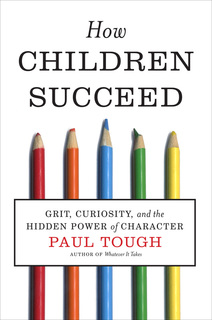
Why do some children succeed while others fail? The story we usually tell about childhood and success is the one about intelligence: success comes to those who score highest on tests, from preschool admissions to SATs. But in How Children Succeed, Paul Tough argues that the qualities that matter more have to do with character: skills like perseverance, curiosity, optimism, and self-control.
Paul Tough introduces us to a new generation of researchers and educators, who, for the first time, are using the tools of science to peel back the mysteries of character. Through their stories—and the stories of the children they are trying to help—Tough reveals how this new knowledge can transform young people’s lives. He uncovers the surprising ways in which parents do—and do not—prepare their children for adulthood. And he provides us with new insights into how to improve the lives of children growing up in poverty. This provocative and profoundly hopeful book will not only inspire and engage readers, it will also change our understanding of childhood itself.
Paul Tough introduces us to a new generation of researchers and educators, who, for the first time, are using the tools of science to peel back the mysteries of character. Through their stories—and the stories of the children they are trying to help—Tough reveals how this new knowledge can transform young people’s lives. He uncovers the surprising ways in which parents do—and do not—prepare their children for adulthood. And he provides us with new insights into how to improve the lives of children growing up in poverty. This provocative and profoundly hopeful book will not only inspire and engage readers, it will also change our understanding of childhood itself.
Complications: A surgeon's Notes on an Imperfect Science by atul gawande
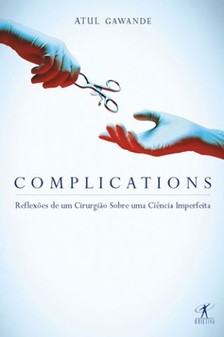
Gently dismantling the myth of medical infallibility, Dr. Atul Gawande's Complications: A Surgeon's Notes on an Imperfect Science is essential reading for anyone involved in medicine - on either end of the stethoscope. Medical professionals make mistakes, learn on the job, and improvise much of their technique and self-confidence. Gawande's tales are humane and passionate reminders that doctors are people, too. His prose is thoughtful and deeply engaging, shifting from sometimes painful stories of suffering patients (including his own child) to intriguing suggestions for improving medicine with the same care he expresses in the surgical theater. Some of his ideas will make health care providers nervous or even angry, but his disarming style, confessional tone, and thoughtful arguments should win over most readers.
Work Hard. Be Nice: How Two Inspired Teachers Created the Most Promising Schools in America by Jay Mathews
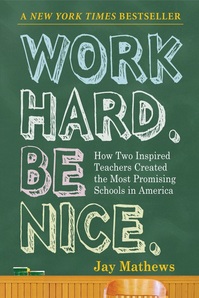
When Mike Feinberg and Dave Levin signed up for Teach for America right after college and found themselves utter failures in the classroom, they vowed to remake themselves into superior educators. They did that—and more. In their early twenties, by sheer force of talent and determination never to take no for an answer, they created a wildly successful fifth-grade experience that would grow into the Knowledge Is Power Program (KIPP), which today includes sixty-six schools in nineteen states and the District of Columbia.
KIPP schools incorporate what Feinberg and Levin learned from America's best, most charismatic teachers: lessons need to be lively; school days need to be longer (the KIPP day is nine and a half hours); the completion of homework has to be sacrosanct (KIPP teachers are available by telephone day and night). Chants, songs, and slogans such as "Work hard, be nice" energize the program. Illuminating the ups and downs of the KIPP founders and their students, Mathews gives us something quite rare: a hopeful book about education.
KIPP schools incorporate what Feinberg and Levin learned from America's best, most charismatic teachers: lessons need to be lively; school days need to be longer (the KIPP day is nine and a half hours); the completion of homework has to be sacrosanct (KIPP teachers are available by telephone day and night). Chants, songs, and slogans such as "Work hard, be nice" energize the program. Illuminating the ups and downs of the KIPP founders and their students, Mathews gives us something quite rare: a hopeful book about education.
Boomerang: Travels in the New Third World by Michael Lewis
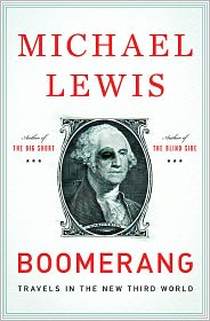
The tsunami of cheap credit that rolled across the planet between 2002 and 2008 was more than a simple financial phenomenon: it was temptation, offering entire societies the chance to reveal aspects of their characters they could not normally afford to indulge.
Icelanders wanted to stop fishing and become investment bankers. The Greeks wanted to turn their country into a piñata stuffed with cash and allow as many citizens as possible to take a whack at it. The Germans wanted to be even more German; the Irish wanted to stop being Irish.
Michael Lewis's investigation of bubbles beyond our shores is so brilliantly, sadly hilarious that it leads the American reader to a comfortable complacency: oh, those foolish foreigners. But when he turns a merciless eye on California and Washington, DC, we see that the narrative is a trap baited with humor, and we understand the reckoning that awaits the greatest and greediest of debtor nations.
Icelanders wanted to stop fishing and become investment bankers. The Greeks wanted to turn their country into a piñata stuffed with cash and allow as many citizens as possible to take a whack at it. The Germans wanted to be even more German; the Irish wanted to stop being Irish.
Michael Lewis's investigation of bubbles beyond our shores is so brilliantly, sadly hilarious that it leads the American reader to a comfortable complacency: oh, those foolish foreigners. But when he turns a merciless eye on California and Washington, DC, we see that the narrative is a trap baited with humor, and we understand the reckoning that awaits the greatest and greediest of debtor nations.
Ill Fares the Land by Tony Judt
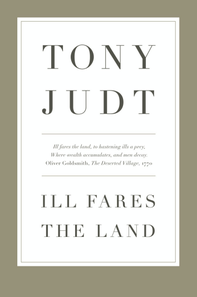
Tony Judt's thought-provoking polemic flies the flag for social democracy and might make people reassess their own beliefs, says Guardian journalist Chris Patten.
"Something is profoundly wrong," argues Judt, "with the way we live today." We have wasted the two decades since the fall of the Berlin Wall; they have been consumed by the locusts, or more precisely by the shamelessly greedy. It has been the era of all the Dicks, from Cheney to Fuld, politically "an age of the pygmies". Unregulated markets have crashed. Wars of choice have left bloody destruction in their wake. The snouts have been buried deep in the trough. Beyond the noise of guzzling, we can hear no moral critique of what has happened, no shout of rage that things don't have to be like this. That is what Judt sets out to provide: a polemic that can offer some hope for the young that there is a better way of organising our affairs. It is called social democracy, and while it represents neither an ideal future nor an ideal past, "it is better than anything else to hand".
Judt's book asks most of the better sort of questions about modern politics. How should we define the role of the state without assuming that the state itself should do everything? How can we restore an argument about values to political debates, which partly because of our straitened circumstances are usually simply about costs and utilitarian benefit? (Look at the present disgraceful treatment by the government of the humanities at our universities.) How can we engage younger citizens in politics, given how much the baby-boomer generation of leaders has discredited what was once seen as an honourable pursuit? Tony Judt himself encourages dissent from conformity, for which there is much to be said.
"Something is profoundly wrong," argues Judt, "with the way we live today." We have wasted the two decades since the fall of the Berlin Wall; they have been consumed by the locusts, or more precisely by the shamelessly greedy. It has been the era of all the Dicks, from Cheney to Fuld, politically "an age of the pygmies". Unregulated markets have crashed. Wars of choice have left bloody destruction in their wake. The snouts have been buried deep in the trough. Beyond the noise of guzzling, we can hear no moral critique of what has happened, no shout of rage that things don't have to be like this. That is what Judt sets out to provide: a polemic that can offer some hope for the young that there is a better way of organising our affairs. It is called social democracy, and while it represents neither an ideal future nor an ideal past, "it is better than anything else to hand".
Judt's book asks most of the better sort of questions about modern politics. How should we define the role of the state without assuming that the state itself should do everything? How can we restore an argument about values to political debates, which partly because of our straitened circumstances are usually simply about costs and utilitarian benefit? (Look at the present disgraceful treatment by the government of the humanities at our universities.) How can we engage younger citizens in politics, given how much the baby-boomer generation of leaders has discredited what was once seen as an honourable pursuit? Tony Judt himself encourages dissent from conformity, for which there is much to be said.
How Soccer Explains the World by Franklin Foer
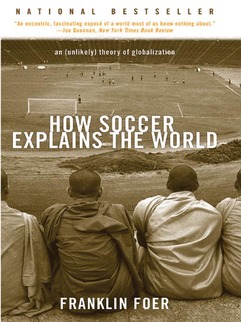
It is an analysis of the interchange between soccer and the new global economy. Author Franklin Foer takes readers on a journey from stadium to stadium around the globe in an attempt to shed new insights on today’s world events, both from political and economic standpoints. Soccer is here the globalized medium that seems to lend itself to explaining the effects globalization has on society as a whole.
In the first part of the book, Foer tries to explain "the failure of globalization to erode ancient hatreds in the game’s great rivalries," commonly referred to as football hooliganism. His case studies include sectarian conflicts between supporters of Celtic F.C and Rangers F.C in Scotland and the tendency of supporters of Tottenhe Hotspur F.C and AFC Ajax to appropriate Jewish symbols and terminology, causing some opposing supporters to employ antisemitic chants and taunts. In the final part, Foer uses soccer "to defend the virtues of old-fashioned nationalism," as "a way to blunt the return of tribalism."
The book thus challenges theories that a universal, globalist philosophy will subsume local nationalisms. Overarching structures such as the European Union and the United Nations may attain structural prominence, but underneath the veneer of these structures, vibrant sub-cultures and tribal loyalties remain, and may even be strengthened by modern communications like the Internet. They may foreshadow not the hope for unity sought by globalized bureaucratic and political elites and corporate oligarchs, but increasing fragmentation and national/ethnic conflict within outward facades of globalized unity.
In the first part of the book, Foer tries to explain "the failure of globalization to erode ancient hatreds in the game’s great rivalries," commonly referred to as football hooliganism. His case studies include sectarian conflicts between supporters of Celtic F.C and Rangers F.C in Scotland and the tendency of supporters of Tottenhe Hotspur F.C and AFC Ajax to appropriate Jewish symbols and terminology, causing some opposing supporters to employ antisemitic chants and taunts. In the final part, Foer uses soccer "to defend the virtues of old-fashioned nationalism," as "a way to blunt the return of tribalism."
The book thus challenges theories that a universal, globalist philosophy will subsume local nationalisms. Overarching structures such as the European Union and the United Nations may attain structural prominence, but underneath the veneer of these structures, vibrant sub-cultures and tribal loyalties remain, and may even be strengthened by modern communications like the Internet. They may foreshadow not the hope for unity sought by globalized bureaucratic and political elites and corporate oligarchs, but increasing fragmentation and national/ethnic conflict within outward facades of globalized unity.
Switch: How to Change Things When Change Is Hard by Chip and Dan Heaths
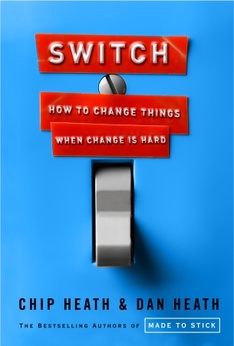
Why is it so hard to make lasting changes in our companies, in our communities, and in our own lives?
The primary obstacle is a conflict that’s built into our brains, say Chip and Dan Heath, authors of the critically acclaimed bestseller Made to Stick. Psychologists have discovered that our minds are ruled by two different systems—the rational mind and the emotional mind—that compete for control. The rational mind wants a great beach body; the emotional mind wants that Oreo cookie. The rational mind wants to change something at work; the emotional mind loves the comfort of the existing routine. This tension can doom a change effort—but if it is overcome, change can come quickly.
In Switch, the Heaths show how everyday people—employees and managers, parents and nurses—have united both minds and, as a result, achieved dramatic results:
In a compelling, story-driven narrative, the Heaths bring together decades of counterintuitive research in psychology, sociology, and other fields to shed new light on how we can effect transformative change. Switch shows that successful changes follow a pattern, a pattern you can use to make the changes that matter to you, whether your interest is in changing the world or changing your waistline.
The primary obstacle is a conflict that’s built into our brains, say Chip and Dan Heath, authors of the critically acclaimed bestseller Made to Stick. Psychologists have discovered that our minds are ruled by two different systems—the rational mind and the emotional mind—that compete for control. The rational mind wants a great beach body; the emotional mind wants that Oreo cookie. The rational mind wants to change something at work; the emotional mind loves the comfort of the existing routine. This tension can doom a change effort—but if it is overcome, change can come quickly.
In Switch, the Heaths show how everyday people—employees and managers, parents and nurses—have united both minds and, as a result, achieved dramatic results:
In a compelling, story-driven narrative, the Heaths bring together decades of counterintuitive research in psychology, sociology, and other fields to shed new light on how we can effect transformative change. Switch shows that successful changes follow a pattern, a pattern you can use to make the changes that matter to you, whether your interest is in changing the world or changing your waistline.
When a Billion Chinese Jump by Jonathan Watts
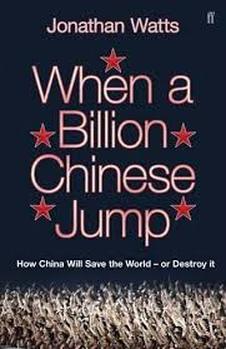
In When a Billion Chinese Jump, Guardian reporter Jonathan Watts takes a journey into the future of our species. Traveling from the mountains of Tibet to the deserts of Inner Mongolia via the Silk Road – through tiger farms, cancer villages, weather-modifying bases, and eco-cities – Watts chronicles the environmental impact of economic growth with a series of gripping stories from the country on the frontline of global development. He talks to nomads and philosophers, entrepreneurs and scientists, rural farmers and urban consumers, examining how individuals are trying to adapt to one of the most spectacular bursts of change in human history. Then he poses a question that will affect all of our lives: Can China find a new way forward or is this giant nation doomed to magnify the same mistakes that have already taken humanity to the brink of disaster?
Being Wrong: Adventures in the Margin of Error by Kathryn Schulz
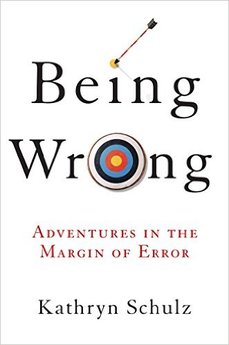
In Being Wrong, journalist Kathryn Schulz explores why we find it so gratifying to be right and so maddening to be mistaken, and how this attitude toward error corrodes relationships—whether between family members, colleagues, neighbors, or nations. Along the way, she takes us on a fascinating tour of human fallibility: from wrongful convictions to no-fault divorce, medical mistakes to misadventures at sea, failed prophecies to false memories. Drawing on thinkers as varied as St. Augustine, Darwin, Freud, Gertrude Stein, Alan Greenspan, and Groucho Marx, she proposes a new way of looking at wrongness. In this view, error is both a given and a gift—one that can transform our worldview, our relationships, and, most profoundly, ourselves. Being Wrong is not just an account of human error but a tribute to human creativity—the way we generate and revise our beliefs about the world and ourselves. A brilliant debut from a new voice in nonfiction, this book calls on us to ask one of life's most challenging questions: what if I'm wrong?
Globalization and Its Discontents by Joseph E. Stiglitz
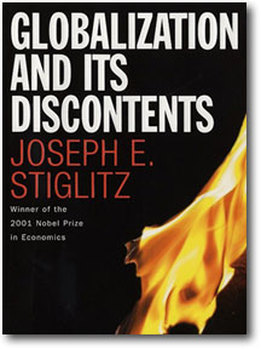
This national bestseller quickly became a touchstone in the globalization debate. Renowned economist and Nobel Prize winner Joseph E. Stiglitz had a ringside seat for most of the major economic events of the last decade, including stints as chairman of the Council of Economic Advisers and chief economist at the World Bank. Particularly concerned with the plight of developing nations, he became increasingly disillusioned as he saw the International Monetary Fund and other major institutions put the interests of Wall Street and the financial community before the developing world. While this book includes no simple formula on how to make globalization work, Stiglitz provides a reform agenda that will provoke debate for years to come. Rarely do we get such an insider's analysis of the major institutions of globalization as in this penetrating book.
Fast Forward by William Antholis and Strobe Talbott
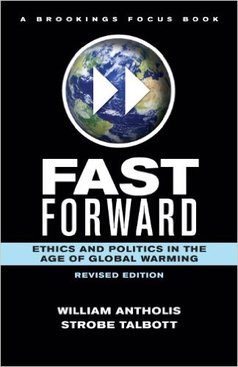
William Antholis and Strobe Talbott guide the reader through two decades of climate change diplomacy, explaining the national and international factors that have influenced and often impeded the negotiations. Their brisk narrative includes behind-the-scenes coverage of Barack Obama's impromptu meeting with key leaders in Copenhagen that broke a logjam and salvaged the agreement. The near-disaster of that summit demonstrated how the United Nations cannot move forward fast enough to produce a global deal. Instead, the "Big Four" -- the United States, the European Union, China, and India -- must drive the next stage of the process. Antholis and Talbott also recommend a new international mechanism modeled on the General Agreement on Tariffs and Trade that would monitor national commitments and create incentives for other countries to coordinate their efforts to cut emissions.

